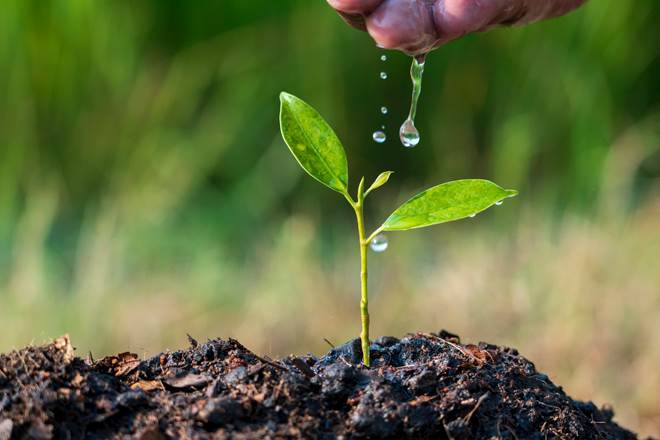By participating in our pledge, not only will you be doing your bit by swapping one UK journey to rail versus taking a car or plane, but we will also plant a tree on your behalf as our way of saying thank you.1
Our incredible partners, onHand, plant much-needed trees in some of the world’s most vulnerable locations such as Haiti, Madagascar, Mozambique and Nepal. Their collective efforts not only support reforestation but also work to increase biodiversity and help communities develop clean, renewable energy.
What are the benefits of trees?
We like to think of trees as the planet’s superhero, especially with these impressive powers:
- Absorbs carbon dioxide and converts it into oxygen
- Improves air quality and helps reduce pollution (who doesn’t want to breathe better?)
- Keeps the air cooler and provides shelter from the sun
- Acts as a home for lots of wildlife
- Helps to prevent flooding
Image credits, Getty Images.
But why is planting a tree important?
It starts with one tree, but soon it can become a forest and that’s what we’re striving to do here at Trainline. There are a lot of reasons why the world’s forests are disappearing, with deforestation, agriculture changes for food production, and wildfires leading the brunt of the impact.
While it’s important to conserve our existing forests and wildlife reserves, rebuilding areas impacted by deforestation and natural disasters work to regenerate impacted land and bring back biodiversity.
When we plant more trees, it also creates more oxygen in the air and helps minimise our planet’s overall carbon footprint. Plus, rebuilding these reserves can promote career opportunities for locals living in developing countries.
How do trees help the impact of natural disasters?
Trees not only work to reduce flooding, but they also help counteract the impact of deforestation by creating a barrier from tropical storms, cyclones, and hurricanes.
When there are fewer trees, especially in coastal areas, it increases water runoff during a storm and contributes to flooding. Also, when the lack of trees and warmer ocean temperatures combine it intensifies rainfall and wind speed which strengthens storms out at sea before they make landfall.
Get to know our tree planting partner onHand
Our partner, onHand, is a volunteering and climate impact platform that brings communities together for the greater good of the planet.
Where are your trees being planted?
Planting trees in balmy tropical forests can help them grow four times faster than they would normally in cooler climates. Plus, these types of trees help reduce soil erosion and provide a habitat for animals and wildlife that may have lost their old stomping ground due to deforestation or natural disasters.
Currently, onHand works with The Eden Reforestation Project to support mangrove reforestation projects in Mozambique and Madagascar. Also, they’ve started The Nepal Reforestation Project to repopulate trees in high-elevation areas near The Great Himalayas, as well as The Haiti Reforestation Project which restores tree populations designed to stablise the land and diversify food production for local communities.
What kind of trees are you planting?
We’re planting a bunch of different trees depending on what will be the most impactful for the area.
- Mangrove trees in the Djabissa mangrove estuary of Madagascar and Maputo Bay of Mozambique. Both projects protect coastal communities from the effects of environmental disasters and improve fisheries, promote biodiversity, and remove carbon from the atmosphere.
- Food-bearing trees in Haiti, such as orange (citrus sinensis), moringa (moringa oleifera), mango (mangifera indica), and cocoa (theobroma cacao). These trees are not only planted to repopulate depleted lands but they’re also helping to improve food security for the local population.
- A wide range of seedlings are being planted in Nepal to develop a thriving ecosystem.
Swap to train and save the planet one journey at a time
Swapping to train is one of the biggest impacts you can make on your carbon footprint2, and we think that’s pretty amazing. So, join us in moving just one journey a year you would otherwise have taken by car or plane, to rail.
Image credits, Getty Images.
See www.icamebytrain.com/FAQs for the facts
[1] The opportunity to have a tree planted on your behalf is subject to availability and will end on the earlier of 25,000 trees being planted, or 23 October 2023. The opportunity to make a pledge will end on 23 October 2023. Trees will be planted by OnHand, who are wholly responsible for planting each tree (Trainline shall not be held responsible if a tree is not planted). Trainline reserves the right to cease planting trees with OnHand at any time. Trainline reserves the right to vary any and all elements of these terms at any time without notice.

